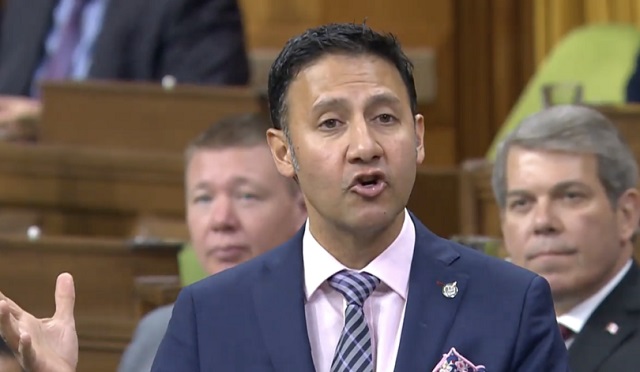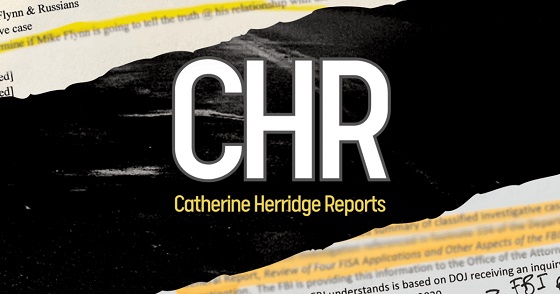Media
Trudeau’s ‘online harms’ legislation includes life imprisonment for ‘hate speech’

Justice Minister Arif Virani
From LifeSiteNews
While the government claims the bill is intended to protect kids, Conservative Party of Canada leader Pierre Poilievre said Liberals are looking for clever ways to enact internet censorship laws.
Details of new “online harms” legislation to regulate the internet have emerged, revealing that the bill could lead to more people jailed for life or fined $20,000 for posts that the government defines as “hate speech” based on gender, race, or other categories.
Bill C-63 is titled “An Act to enact the Online Harms Act, to amend the Criminal Code, the Canadian Human Rights Act and An Act respecting the mandatory reporting of Internet child pornography by persons who provide an Internet service and to make consequential and related amendments to other Acts.”
It was introduced by Justice Minister Arif Virani in the House of Commons today and passed its first reading in the afternoon.
The new bill will create the Online Harms Act and modify existing laws, amending the Criminal Code as well as the Canadian Human Rights Act, in what the Liberals under Prime Minister Justin Trudeau claim will target certain cases of internet content removal, notably those involving child sexual abuse and pornography.
According to the Trudeau government, Bill C-63 aims to protect kids from online harms and crack down on non-consensual deep-fake pornography involving children and will target seven types of online harms, such as hate speech, terrorist content, incitement to violence, the sharing of non-consensual intimate images, child exploitation, cyberbullying and inciting self-harm.
Virani had many times last year hinted a new Online Harms Act bill would be forthcoming.
While the Trudeau government claims the bill is being created to protect kids, Conservative Party of Canada (CPC) leader Pierre Poilievre said the federal government is looking for clever ways to enact internet censorship laws.
During a February 21, press conference, Poilievre said that Trudeau is looking to in effect criminalize speech with he does not like.
“What does Justin Trudeau mean when he says the word ‘hate speech?’ He means speech he hates,” Poilievre said.
Thus far, Poilievre has not commented on the full text of Bill C-63.
As part of the new bill, the Trudeau Liberals are looking to increase punishments for existing hate propaganda offenses in a substantial manner.
The Online Harms Act will also amend Canada’s Human Rights Act to put back in place a hate speech provision, specifically Section 13 of the Act, that the previous Conservative government under Stephen Harper had repealed in 2013 after it was found to have violated one’s freedom of expression.
The text of the bill, released Monday afternoon, reads that the Canadian Human Rights Act will be amended to add a section “13” to it.
This section reads, “It is a discriminatory practice to communicate or cause to be communicated hate speech by means of the Internet or any other means of telecommunication in a context in which the hate speech is likely to foment detestation or vilification of an individual or group of individuals on the basis of a prohibited ground of discrimination.”
“In this section, hate speech means the content of a communication that expresses detestation or vilification of an individual or group of individuals on the basis of a prohibited ground of discrimination,” the bill reads.
A “Clarification – hate speech” in the bill reads, “For greater certainty, the content of a communication does not express detestation or vilification, for the purposes of subsection (8), solely because it expresses disdain or dislike or it discredits, humiliates, hurts or offends.”
Earlier Monday, details of the bill were released to the media in a technical briefing.
“New standalone hate crime offence that would apply to every offence in the Criminal Code and in any other Act of Parliament, allowing penalties up to life imprisonment to denounce and deter this hateful conduct as a crime in itself,” the technical briefing reads.
“The maximum punishments for the four hate propaganda offences from 5 years to life imprisonment for advocating genocide and from 2 years to 5 years for the others when persecuted by way of indictment.”
For now, the law will affect all social media platforms as well as live-streamed video services, notably Meta and Google (YouTube).
Bill creates three ‘Digital Safety’ positions to enforce rules and let anyone file ‘complaints’
Bill C-63 mandates the creation of the Digital Safety Commission, a digital safety ombudsperson, and the Digital Safety Office.
The ombudsperson along with the other offices will be charged with dealing with public complaints regarding online content as well as put forth a regulatory function in a five-person panel “appointed by the government.” This panel will be charged with monitoring internet platform behaviors to hold people “accountable.”
Bill C-63 also includes text to amend Canada’s Criminal Code and Human Rights Act to define “hatred” as “Content that expresses detestation or vilification of an individual or group of individuals on the basis of a prohibited ground of discrimination, within the meaning of the Canadian Human Rights Act, and that, given the context in which it is communicated, is likely to foment detestation or vilification of an individual or group of individuals on the basis of such a prohibited ground. (contenu fomentant la haine).”
Most worryingly, the new bill will allow it so that anyone can file a complaint against another person with the Canadian Human Rights Commission for “posting hate speech online” that is deemed “discriminatory” against a wide range of so-called protected categories, notably gender, race, those, or other areas.
If a person is found guilty of violating the Human Rights Act by going against what the government deems to be hate speech, they face fines of $20,000 along with being mandated to take down any postings online, notably on social media.
Many aspects of Bill C-63 come from a lapsed bill from 2021.
In June 2021, then-Justice Minister David Lametti introduced Bill 36, “An Act to amend the Criminal Code and the Canadian Human Rights Act and to make related amendments to another Act (hate propaganda, hate crimes and hate speech).”
It was blasted as a controversial “hate speech” law that would give police the power to “do something” about online “hate.”
It was feared that it would target bloggers and social media users for speaking their minds.
Bill C-36 included text to amend Canada’s Criminal Code and Human Rights Act to define “hatred” as “the emotion that involves detestation or vilification and that is stronger than dislike or disdain (haine).”
If passed, the bill would theoretically allow a tribunal to judge anyone who has a complaint of online “hate” leveled against them, even if he has not committed a crime. If found guilty, the person would be in violation of the new law and could face fines of $70,000 as well as house arrest.
Two other Trudeau bills dealing with freedom as it relates to the internet have become law, the first being Bill C-11, or the Online Streaming Act, that mandates Canada’s broadcast regulator, the Canadian Radio-television and Telecommunications Commission (CRTC), oversee regulating online content on platforms such as YouTube and Netflix to ensure that such platforms are promoting content in accordance with a variety of its guidelines.
Trudeau’s other internet censorship law, the Online News Act, was passed by the Senate in June 2023.
The law mandates that Big Tech companies pay to publish Canadian content on their platforms. As a result, Meta, the parent company of Facebook and Instagram, blocked all access to news content in Canada. Google has promised to do the same rather than pay the fees laid out in the new legislation.
Critics of recent laws such as tech mogul Elon Musk have said it shows “Trudeau is trying to crush free speech in Canada.”
Catherine Herridge
How X And Joe Rogan Broke The Back of 60 Minutes

| TOP LINE: | |||||||||||||||
| Super consumers of news are flocking to X and other platforms that support independent journalism, diverse voices and embrace transparency. The post election TV ratings abyss is driven both by technology and by the public’s loss of trust in Mainstream media. | |||||||||||||||
| DEEP DIVE: | |||||||||||||||
| To buy MSNBC or not to buy? | |||||||||||||||
| This week’s headline that Comcast will spin off its cable channels underscores the tectonic shift in the media marketplace and how technology is providing the exit ramp for competing platforms. | |||||||||||||||
| When my job as a senior investigative correspondent at CBS News was terminated in February, I took a few months to educate myself about the marketplace because so much had changed since I left Fox in 2019. What I found was genuinely surprising, a little frightening and, oddly, re-assuring for the strength of our democracy. | |||||||||||||||
| You can’t argue with the data. It is compelling. On Election Day, according to @Xdata, the platform boasted record usage of 942 million posts worldwide and 2.2 million hours of watch or listen time over approximately 160k live events. The X data crushed engagement numbers for the mainstream media (MSM.) | |||||||||||||||
|
|||||||||||||||
| By example, a Tucker Carlson interview on X has 35 million engagements. The CBS Evening News has 4.5 million viewers. If I had to choose, I’d take 30 million engagements on X because it represents explosive growth. | |||||||||||||||
|
|||||||||||||||
| The new super consumers of news are flocking to X and other platforms that support independent journalism, diverse voices, and embrace transparency which can strengthen democracy. This is nothing short of an industrial revolution driven both by technology and by loss of trust in corporate media. | |||||||||||||||
| In 2023, Human Rights lawyer Jacob Mchangama wrote about the upheaval and resulting, “elite panic.” | |||||||||||||||
| “Elite panic is this recurring phenomenon throughout the history of free speech, where whenever the public sphere is expanded, either through new communications technology, or to segments of the population that were previously marginalized, the traditional gatekeepers, the elites who control access to information, tend to fret about the dangers of allowing the unwashed mob — who are too fickle, too unsophisticated, too unlearned — unmediated access to information. They need information to be filtered through the responsible gatekeepers and it may be even more dangerous to allow them to speak without adult supervision. That’s a phenomenon that we see again and again. And we’re seeing it play out now on social media. … [Elite panic is] one contributing factor to the free speech recession.” | |||||||||||||||
|
|||||||||||||||
| If you asked me four years ago, if a presidential candidate could skip a 60 Minutes interview, I would have been skeptical. Four years later, candidate Trump bypassed the legacy news magazine and instead, sat down with Joe Rogan. As of this writing, the marathon sit-down viewership reached 51 million views. | |||||||||||||||
| There is no doubt Rogan is a skilled interviewer who can draw out his subjects and deliver huge audiences. Compared to heavily edited network TV reports, the raw, unedited format reveals much about the subject. In politics, the podcast is perfectly suited for the “beer question” which measures a candidate’s authenticity and likability. | |||||||||||||||
| The progressive Harris campaign took a more traditional media approach and came up short. Neither celebrity endorsements which feel less relevant nor a 60 Minutes interview seemed to move the needle. The combined audience of the 60 Minutes Kamala Harris interview and its views on YouTube landed at about 10 million, far less than what Rogan and X delivered. | |||||||||||||||
| The legacy of the Kamala Harris 60 Minutes interview is not her responses but the lingering controversy over the CBS’ interview edit. And that is where the public’s loss of trust in the media comes in. I believe this is another driver of the audience exodus. | |||||||||||||||
| CBS aired two different answers from the Vice President to the same question from correspondent Bill Whitaker about the Israeli Prime Minister apparently ignoring the Biden Administration. | |||||||||||||||
|
|||||||||||||||
| Since, a credible complaint has been filed at the FCC alleging “news distortion” at the network with a reasonable demand that the full, unedited Kamala Harris transcript be released. CBS News has said “it fairly presented the interview to inform the viewing audience and not to mislead it.” | |||||||||||||||
| In the October newsletter, I explained that releasing the full, unedited transcript would resolve these questions. There is ample precedent. | |||||||||||||||
|
|||||||||||||||
| As a senior investigative correspondent at CBS News, I interviewed President Trump at the height of the COVID-19 pandemic. I advocated for and CBS News published the full, unedited transcript. | |||||||||||||||
| The CBS News Trump interview was not a special case. The full, unedited transcript from Attorney General Bill Barr’s 2019 interview with CBS chief legal affairs correspondent Jan Crawford was also shared by the network. And more recently, 60 Minutes released the full unedited transcript of its interview with Fed Chair Jerome Powell. | |||||||||||||||
| If the current trend continues, in the 2028 election cycle, the broadcast networks will firmly take a back seat to podcasts, town halls, and investigative journalism on X. For independent journalists and small digital newsrooms, the challenge is developing revenue streams that are viable. | |||||||||||||||
| In February, I was not comforted by the analogy that losing my corporate reporting job was like getting pushed off the Titanic when there were still seats in the lifeboats. In retrospect, I wonder if it may turn out to be more accurate than I initially thought. | |||||||||||||||
| After turning down job offers for which I remain grateful, I began building the Catherine Herridge Reports brand on X and in the newsletter marketplace. These platforms are the new media beachheads. Content is King. | |||||||||||||||
| I’ll have more to say about the future of journalism and why journalism is called a profession for a reason. Look for exclusive new content on media accountability in the coming days! | |||||||||||||||
| Thank you for subscribing to our newsletter and supporting independent investigative journalism! |
Censorship Industrial Complex
Tucker Carlson: Longtime source says porn sites controlled by intelligence agencies for blackmail

From LifeSiteNews
Journalist Glenn Greenwald replied with a story about how U.S. Speaker of the House of Representatives Mike Johnson changed his tune on a dime about the Foreign Intelligence Surveillance Act (FISA), which allows the government to spy on American communications without a warrant. The journalist made the caveat that he is not assuming blackmail was responsible for Johnson’s behavior.
Tucker Carlson shared during an interview released Wednesday that a “longtime intel official” told him that intelligence agencies control the “big pornography sites” for blackmail purposes.
Carlson added that he thinks dating websites are controlled as well, presumably referring at least to casual “hook-up” sites like Tinder, where conversations are often explicitly sexual.
“Once you realize that, once you realize that the most embarrassing details of your personal life are known by people who want to control you, then you’re controlled,” Carlson said.
He went on to suggest that this type of blackmail may explain some of the strange, inconsistent behavior of well-known figures, “particularly” members of Congress.
“We all imagine that it’s just donors” influencing their behavior, Carlson said. “I think it’s more than donors. I’ve seen politicians turn down donors before.”
Journalist Glenn Greenwald replied with a story about how U.S. Speaker of the House of Representatives Mike Johnson changed his tune on a dime about the Foreign Intelligence Surveillance Act (FISA), which allows the government to spy on American communications without a warrant. The journalist made the caveat that he is not assuming blackmail was responsible for Johnson’s behavior.
Greenwald told how he had seen Johnson grill FBI Director Christopher Wray about his agency’s spying and “could just tell that he felt passionately about (this),” prompting Greenwald to invite Johnson on his show, before anyone had any idea he might become Speaker of the House.
“One of the things we spent the most time on was (the need for) FISA reform,” Greenwald told Carlson, noting that the expiration of the current iteration of the FISA law was soon approaching. He added that Johnson was “determined” to help reform FISA and that it was in fact “his big issue,” the very reason he was on Greenwald’s show to begin with.
Johnson said regarding FISA, “We cannot allow this to be renewed; it’s a great threat to American democracy; at the very least, we need massive, fundamental reform” according to Greenwald.
Johnson became House Speaker about two months to three months later, and Greenwald was excited about the FISA reform he thought Johnson would surely help bring about.
“Not only did Mike Johnson say, ‘I’m going to allow the FISA renewal to come to the floor with no reforms.’ He himself said, ‘It is urgent that we renew FISA without reforms. This is a crucial tool for our intelligence agencies,’” Greenwald reounted.
He noted that Johnson was already getting access to classified information while in Congress, wondering at Johnson’s explanation for his behavior at the time, which was that he was made aware of highly classified information that illuminated the importance of renewing FISA and the spying capabilities it grants, as is.
Greenwald doesn’t believe one meeting is enough to change the mind of someone who is as invested in a position as Johnson was on FISA reform.
“I can see someone really dumb being affected by that … he’s a very smart guy. I don’t believe he changed his mind. So the question is, why did he?” Greenwald asked.
“I don’t know. I really don’t. But I know that the person that was on my show two months ago no longer exists.”
Theoretically, there are many ways an intelligence agency could coerce a politician or other person of influence into certain behaviors, including personal threats, threats to family, and committing outright acts of aggression against a person.
A former CIA agent has testified during an interview with Candace Owens that his former employer used the latter tactic against him and his family, indirectly through chemicals that made them sick, when he blew the whistle on certain unethical actions the CIA had committed.
“This is why you never hear about CIA whistleblowers. They have a perfected system of career destruction if you talk about anything you see that is criminal or illegal,” former CIA officer Kevin Shipp said.
As a form of coercion, sexual blackmail in particular is nothing new, although porn sites make the possibility much easier. In her book “One Nation Under Blackmail: The Sordid Union Between Intelligence and Crime That Gave Rise to Jeffrey Epstein,” investigative journalist Whitney Webb discusses not only how the intelligence community uses sexual blackmail through people like Jeffrey Epstein but how it was used by organized crime before U.S. intelligence even existed.
-

 Brownstone Institute1 day ago
Brownstone Institute1 day agoThe Most Devastating Report So Far
-

 Economy2 days ago
Economy2 days agoCOP 29 leaders demand over a $1 trillion a year in climate reparations from ‘wealthy’ nations. They don’t deserve a nickel.
-

 Censorship Industrial Complex2 days ago
Censorship Industrial Complex2 days agoAnother Mass Grave?
-

 ESG20 hours ago
ESG20 hours agoCan’t afford Rent? Groceries for your kids? Trudeau says suck it up and pay the tax!
-

 Alberta2 days ago
Alberta2 days agoMAiD In Alberta: Province surveying Albertans about assisted suicide policies
-

 Energy2 days ago
Energy2 days agoOttawa’s proposed emission cap lacks any solid scientific or economic rationale
-

 Alberta2 days ago
Alberta2 days agoOn gender, Alberta is following the science
-

 International21 hours ago
International21 hours agoElon Musk praises families on X: ‘We should teach fear of childlessness,’ not pregnancy











